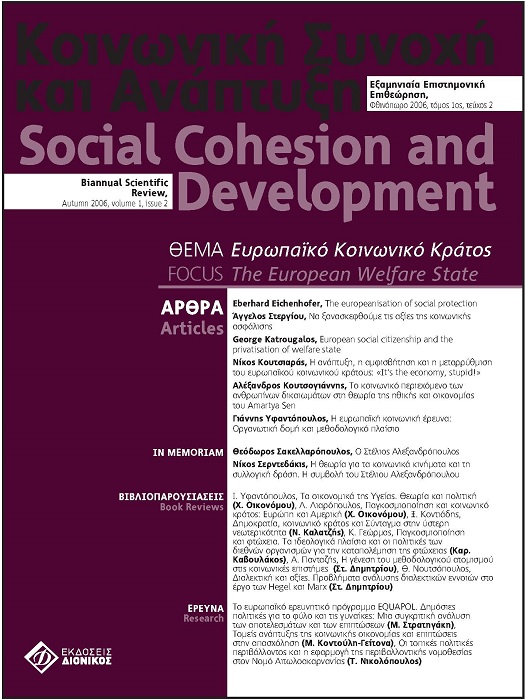Η ανάπτυξη, η αμφισβήτηση και η μεταρρύθμιση του ευρωπαϊκού κοινωνικού κράτους: «It’s the economy, stupid!»
Abstract
Η μεταπολεμική ανάπτυξη του ευρωπαϊκού κοινωνικού κράτους ευνοήθηκε από τις εξαιρετικές οικονομικές επιδόσεις της (χρυσής) εποχής – αλλά και συνέτεινε στην επίτευξή τους. Όμως, η ραγδαία εξασθένιση των οικονομικών επιδόσεων από τις αρχές της δεκαετίας του ’70 και, κυρίως, η αύξηση της ανεργίας, έφεραν αναπόφευκτα στην επιφάνεια τις αστοχίες των κοινωνικών πολιτικών και πολιτικών απασχόλησης, υπό την έννοια της σοβαρής στρέβλωσης των οικονομικών κινήτρων, την ίδια στιγμή θέτοντας υπό σοβαρή αμφισβήτηση την επάρκεια και βιωσιμότητα του ευρωπαϊκού κοινωνικού κράτους. Η άρση των στρεβλώσεων, λοιπόν, συγκαταλέγεται μεταξύ των προτεραιοτήτων μεταρρύθμισης των θεσμών του κοινωνικού κράτους και αποκατάστασης της αποτελεσματικότητάς του.
Article Details
- Zitationsvorschlag
-
Κουτσιαράς Ν. (2016). Η ανάπτυξη, η αμφισβήτηση και η μεταρρύθμιση του ευρωπαϊκού κοινωνικού κράτους: «It’s the economy, stupid!». Social Cohesion and Development, 1(2), 43–55. https://doi.org/10.12681/scad.9015
- Rubrik
- Articles

Dieses Werk steht unter der Lizenz Creative Commons Namensnennung - Nicht-kommerziell - Weitergabe unter gleichen Bedingungen 4.0 International.
Authors who publish with this journal agree to the following terms:
- Authors retain copyright and grant the journal right of first publication with the work simultaneously licensed under a Creative Commons Attribution Non-Commercial License that allows others to share the work with an acknowledgement of the work's authorship and initial publication in this journal.
- Authors are able to enter into separate, additional contractual arrangements for the non-exclusive distribution of the journal's published version of the work (e.g. post it to an institutional repository or publish it in a book), with an acknowledgement of its initial publication in this journal.
- Authors are permitted and encouraged to post their work online (preferably in institutional repositories or on their website) prior to and during the submission process, as it can lead to productive exchanges, as well as earlier and greater citation of published work (See The Effect of Open Access).



